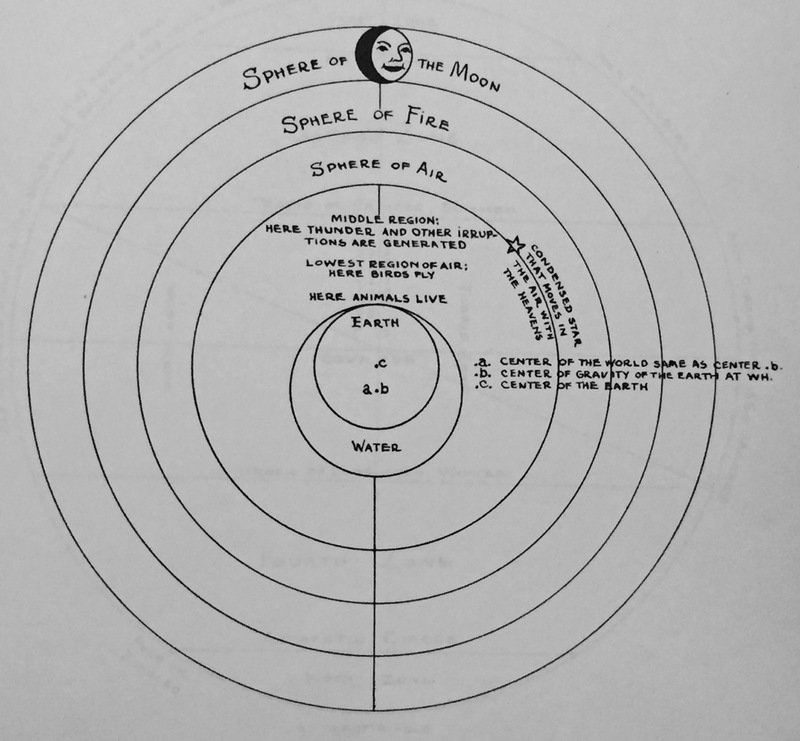Background
The intellectual history of what counts as “science” becomes especially murky in the premodern period (before 1500 CE), and historians must take care not to introduce modern distinctions among science, pseudoscience, or non-science into their evaluation of medieval intellectual pursuits. The so-called “sister disciplines” of astronomy and astrology, in particular, have received unbalanced treatment from historians in recent decades, largely as a result of changing attitudes towards astrology and its role in medieval European intellectual life. Much of this historiographical discord stems from disagreement over the extent and the means by which astronomy and astrology were related.
The tension between astronomical and astrological bodies of knowledge—or, in Latin, astronomia and astrologia—has a chartable modulation in 20th century historiography (which may be worthy of scholarly attention in its own right). George Sarton, recognized as the founder of the history of science discipline, expressed strong condescension toward astrology, portraying astrology as “debased” and “the superstitious flotsam of the Near East." From the mid-20th century onwards, however, historians have increasingly acknowledged the inseparability of astronomia and astrologia in the medieval worldview. Some have convincingly argued that the philosophical aspects of the astral sciences provided the unifying principle which underwrote scientific thought prior to Newtonian physics: as Lynn Thorndike, quoting a colleauge, wrote in 1955, if “the object of all science is ‘the detection of regularities in our experience and the expression of those regularities in the simplest and most comprehensive rational form,’ such regularity had been the aim, the ideal, the boast and the assumption of astrology."
Yet both medieval and modern scholars acknowledge some differentiation between thought characterized as “astrological” and “astronomical,” which implicitly involves a spectrum between "astronomical" and "cosmological" thinking. As a handy rule of demarcation, most scholars hold that astronomy is concerned with theoretical models, while cosmology or natural philosophy is concerned with reality and “true principles.” Within historiographical debates over the finer points, most scholars agree that “astronomy” involved technical discussions comprised of tabulations data derived from celestial observations, and planetary modeling to the extent that it accurately conformed to the compiled data. On the other hand, “cosmology” attempted to explain celestial movements as they conformed to philosophical principles inherited from ancient sources, which may also involve planetary modeling. “Astrology” formed a porous category between the two, in that it relied on the data compiled from astronomical observations while drawing on cosmological discussions of universal coherence and harmony.
As these historiographical tendencies illustrate, using modern categories and their implicit assumptions (for example, that astronomy is scientific, but astrology pseudoscientific) complicates our understanding of the medieval relationship between the astral sciences, and makes it difficult to determine with any precision the role astrologia played in medieval scientific thought. A more productive approach would be to consider the terms as medieval writers themselves employed them, and then to evaluate the extent to which a given text should be considered “scientific” or “philosophical.” However, medieval thinkers sometimes employed astrologia and astronomia to mean the inverse of what we mean today—or even used them interchangeably to refer to either of the two astral sciences! Therefore, we must consider not the terms per se but the semantic meaning of those terms.
This project thus proposes to locate the words astrologia, astronomia, and related terms—such as cosmographia or mathematici (which often refers to practitioners of astrology)—in Latin texts likely to distinguish between astrology and astronomy, and to analyze the semantic contexts in which those terms were deployed. However, most medieval writers would not have been interested in the boundary between astrology and astronomy, except in scholarly treatises that argued for or against astrology’s legitimacy and explanatory power. Consequently, the central core of this project will evaluate the use of astral science terms (astrologia, astronomia, mathematici, etc.) in texts recognized by modern historians as contributing to debates over the proper role of so-called astrological thought, and position them in relation to astronomical and cosmological thinking as outlined above.
Fortunately a number of such texts exist, since medieval astrology was criticized on multiple fronts—especially after the introduction of more elaborate techniques and explanations from Arabic sources in the 12th and 13th centuries. First, astrological accuracy was questionable at best, as technical and instrumental precision was not sufficient to justify the detail of astrological prediction. Second and more importantly, astrology was criticized for interpreting celestial phenomena as causes rather than signs; planets could be interpreted either as instruments subject to divine will whose sole purpose was to deliver divine messages, or as instruments catalyzing action in and of themselves (a theologically circumspect, even blasphemous, explanation). Third, and following from the second, was the charge that astrology perpetuated belief in celestial determination of terrestrial events, which contradicted the central Christian tenet of free will. Although Aquinas’ 13th century reconciliation between Christian tenets and celestial propositions portrayed astral influence as voluntary rather than obligatory (thereby removing the problem of astral causation from the determinism debate in scholarly circles), charges of astral determinism reappeared in Christian condemnations of astrology for centuries.
By analyzing terms employed by medieval intellectuals in their original contexts (dating from the 13th century onwards), this project hopes to recalibrate the current historiographical tension surrounding use of the term "astrology" in modern history of science scholarship, thereby opening more avenues of inquiry as to astrologia's role in astronomical thought, cosmological and philosophical thought, or both.
